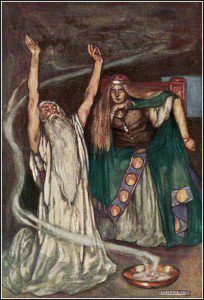
When I look back at the Druids who most influenced the development of my spiritual life, I have to acknowledge a tricky thing. The ones I did not entirely get on with were probably also the ones who had most impact. I’ve been blessed with some lovely and extraordinary friends and mentors along the way as well, and I value the way those networks have nurtured me. I feel most comfortable in webs of interconnected people without hierarchy, with sharing and inspiration flowing freely, but it’s not always been like that.
I was first directed to the work of Emma Restall Orr by a teacher who had already decided I was unteachable. Other teachers have since found me entirely teachable, but I take nothing on trust and ask awkward questions. I was never a good student for someone who just wanted to instruct without having to explain. From this, I learned how to be a more accommodating sort of teacher, though. I think the first book I read by Emma Restall Orr was the one on ritual. I didn’t like the writing style – it was like wading through honey. I also wasn’t drawn to any of the ideas about ritual in the book, which didn’t much help with existing conflict between myself and my then-mentor.
Later, I went on to read Druid Priestess, Kissing the Hag, Living with Honour, The Wakeful World and other bits and pieces. Mixed feelings all the way. None of these books will teach a person how to be a Druid. They are experiential and laden with ideas, but the person who wants to learn Druidry has to do a lot of figuring out to draw something out that will help with their own journey. And so I learned that I wanted to write books that offered widely usable tools, and that I was going to have to get out there and start figuring all that out for myself if I was going to be of any use to anyone. That pretty much now defines what I do as a Druid author.
Emma Restall Orr’s books hint at mystery. They suggest magic and deeper insight. That sense of possibility is, I think, a big part of what draws readers to her work. There’s a kind of glamour to it (in the old sense) and people hungry for alternative spirituality are almost bound to be captivated by that. I certainly was. That sense of something wonderful that I have not quite achieved yet. The insight that remains forever out of my reach. The ways of Being A Druid that call for innate qualities that I will never possess. It’s all too easy to write in a way that leaves the reader feeling a little bit less powerful, a little bit less magical, a little bit more in awe. That may be as much the responsibility of the reader as it is the author: our willingness to be persuaded that we are not in the same league is a consideration.
But, judging by the quantities of heroine worship out there, I was not alone in going through this. The door into the mystery remains hidden; there’s no opening to show you how to go forward. I went through something, and I emerged, changed by the experience. I went through that space of looking up to those wiser and greater than myself, and I became totally unwilling to surrender any of my autonomy to anyone else – mentor or otherwise. I became absolutely wary of the notion of authority almost implicit in authorship, and I started to develop a language of uncertainty that has served me ever since. I ceased to be a follower, and I changed. I know that one person cannot tell another person how to be a Druid – it doesn’t really work. But you can dish out vague maps of the forest, resplendent with ‘here be dragons’ areas, and you can suggest things to try, and ways to begin and provide support and encouragement for those who are having a go.
The path is always down to the person who walks it, but we can do more than just share a few tales from the journey. I can’t teach anyone how to be a Druid, but I can help them figure it out for themselves. Emma Restall Orr is well known for her style of language, which she describes herself as ‘animist poetry’. Again, I think what I’ve done with this is to react and go the other way. I look for precise language use, and for familiar language. I’m careful to try and avoid writing things that exclude, either through lack of clarity, or use of wholly unfamiliar terms. This is an odd place to be because poetry has always been a part of what I do.
In rebelling, I’ve moved towards a different kind of language. None of this is new or original. There’s a long tradition of reactionary students who feel obliged to run off in another direction to their mentors. We do it with our parents as well. Sometimes we do it in anger, feeling let down by the person who failed to live up to our expectations. Amongst other things, I’ve learned that I do not have the gods-given right to go round expecting anyone else to be anything else. Mentors included.
Everything that I have learned, I could probably have learned just as well from gentle and supportive mentoring by people more on my wavelength. I can only guess where that would have taken me. I wonder, though, if a gentler journey would have made me more complacent about things that have since become really important to me.

















